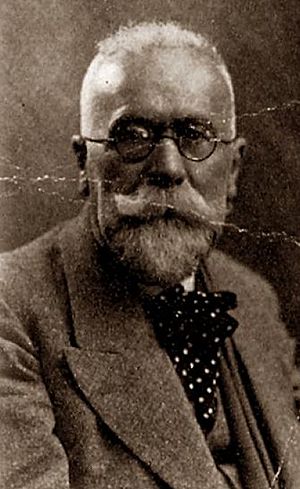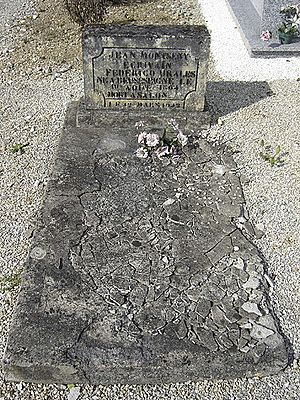Joan Montseny facts for kids
Quick facts for kids
Joan Montseny i Carret
|
|
|---|---|
 |
|
| Born | 1864 |
| Died | 1942 (aged 77–78) Salon, France
|
| Nationality | Catalan |
| Other names | Federico Urales |
| Occupation | Journalist |
| Known for | Anarchist activism |
| Spouse(s) | Teresa Mañé i Miravet |
| Children | Frederica Montseny i Mañé |
Joan Montseny i Carret (1864–1942) was an important writer and journalist from Catalonia, Spain. He was also known by his pen name, Federico Urales. Joan was a key figure in the anarchist movement.
Contents
His Early Life and Work
Joan Montseny was born in Reus, Spain, in 1864. When he was younger, he worked as a cooper, making barrels. He even led a union for coopers in the late 1880s.
Joan also studied to become a teacher. In 1891, he ran a school in his hometown. Because of his activities in the anarchist movement, he was arrested several times. In 1897, he was sent away to London, but he secretly came back to Spain later that year. He wanted to challenge the legal decisions made against him.
Becoming a Journalist
Montseny became a journalist and a writer. He worked for a newspaper called El Progreso. Later, he started his own magazines. These included La Revista Blanca (which means 'The White Magazine') in 1898 and Tierra y Libertad ('Land and Liberty') in 1902. These magazines became very popular.
He wrote many books, including a novel called Sembrando Flores (meaning 'Sowing Flowers') in 1906. From 1923 to 1936, he restarted La Revista Blanca in Barcelona. He also started a weekly magazine called El Luchador ('The Fighter') from 1931 to 1933. Through his writing, he wanted to encourage social change.
His Anarchist Ideas
Joan Montseny believed in a type of anarchism that focused on individual freedom. This idea meant that people should be free from government control. He believed in "anarchism without adjectives," which means he supported many different ways to achieve an anarchist society.
His family's strong anarchist beliefs sometimes differed from other groups, like the Confederación Nacional del Trabajo (CNT), a large labor union. Even though he didn't officially join some groups, his ideas were very influential. His daughter, Federica Montseny, also became a famous anarchist and politician.
In 1939, Joan Montseny had to leave Spain and went to southwestern France. He passed away there in 1942.
His Family Life
In 1891, Joan Montseny married Teresa Mañé. She was also a writer and known by her pen name, Soledad Gustavo. Together with their daughter, Federica, they were a family deeply involved in the anarchist movement.
His Writings
Joan Montseny wrote many books and articles. Here are some of his important works:
- El sindicalismo español y su orientación (Spanish Syndicalism and Its Orientation, 1923)
- La anarquía al alcance de todos (Anarchism for All, 1928)
- Los municipios libres (Free Municipalities, 1932)
- El ideal y la revolución (The Ideal and the Revolution, 1932)
- La evolución de la filosofía en España (The Evolution of Philosophy in Spain, 1934, two volumes)
His Autobiography
- Mi vida (My Life, 1932, three volumes)
His Novels
- Sembrando Flores (Sowing Flowers, 1906)
- Los hijos del amor (The Children of Love, 1922)
- Los grandes delincuentes (The Great Criminals, 1923)
His Collections
- La Novela Ideal (The Ideal Novel, 1925–1937)
- La Novela Libre (The Free Novel, 1929–1937)
See also
 In Spanish: Juan Montseny Carret para niños
In Spanish: Juan Montseny Carret para niños
 | Emma Amos |
 | Edward Mitchell Bannister |
 | Larry D. Alexander |
 | Ernie Barnes |


